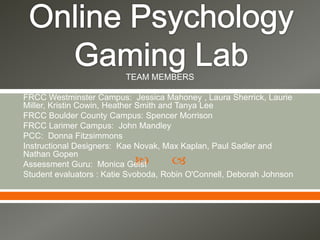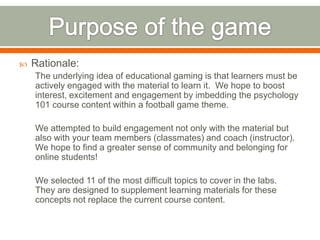Tackling Psychology 101- Psychology Game Lab
- 1. TEAM MEMBERS FRCC Westminster Campus: Jessica Mahoney , Laura Sherrick, Laurie Miller, Kristin Cowin, Heather Smith and Tanya Lee FRCC Boulder County Campus: Spencer Morrison FRCC Larimer Campus: John Mandley PCC: Donna Fitzsimmons Instructional Designers: Kae Novak, Max Kaplan, Paul Sadler and Nathan Gopen Assessment Guru: Monica Geist Student evaluators : Katie Svoboda, Robin O'Connell, Deborah Johnson ’éŚ ’é¢
- 2. ’éś Rationale: The underlying idea of educational gaming is that learners must be actively engaged with the material to learn it. We hope to boost interest, excitement and engagement by imbedding the psychology 101 course content within a football game theme. We attempted to build engagement not only with the material but also with your team members (classmates) and coach (instructor). We hope to find a greater sense of community and belonging for online students! We selected 11 of the most difficult topics to cover in the labs. They are designed to supplement learning materials for these concepts not replace the current course content.
- 3. ’éś Collaboration We have members who represent several different campuses and colleges. We have also included faculty, instructors and students in the process. This game will be made available on creative commons for anyone who is interested in adopting it for an online or ground class.
- 4. ’éś ’éś ’éś ’éś ’éś Level of student engagement and persistence will be measured with student surveys. Content knowledge will be measured with pre and post-test comparisons within game sections and between gaming and traditional online sections. Student success will be assessed. We have operationally defined success as students getting a C or above. We can compare within the game classes based on number of labs completed and well as between game and traditional classes. Attrition will be measured by comparing the drop rates. Student perceptions will be measured by asking qualitative questions (e.g., challenging, applicable, helpful on the exam etc.)
- 5. ’éś ’éś All labs are ADA compliant for deaf students and those with some visual impairments. To access the game students simply download the link onto their computers or a thumb-drive and they are ready to play. Instructors can access their lab scores through D2L.
- 6. ’éś You tube video of psychology gaming lab
- 7. ’éś ’éś ’éś ’éś Data Collection and analysis. Make available to all online classes at FRCC. Make available to ground classes at FRCC Work with other Community Colleges and their IT departments to try and make available across the system!






